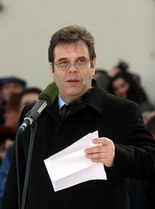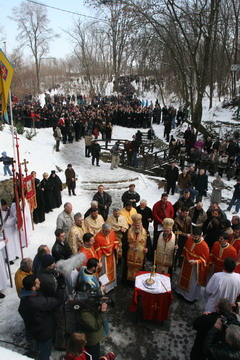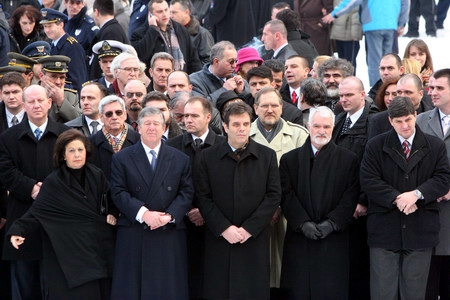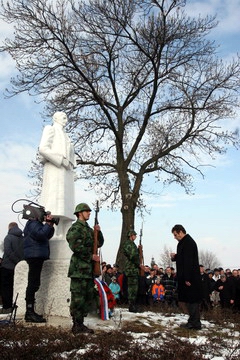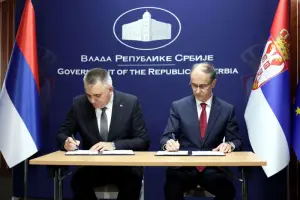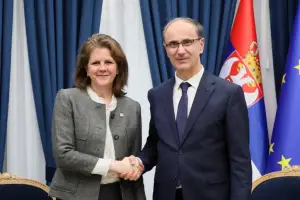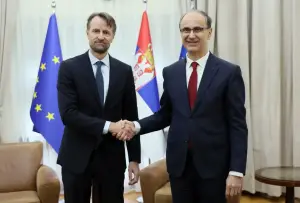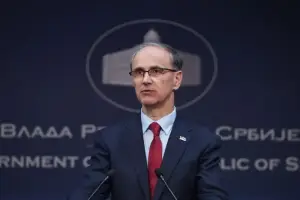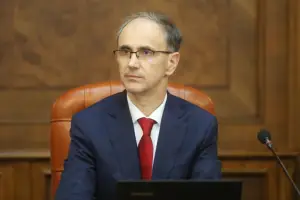Q:
A:
Serbia advocates universal principles based on international law in resolving Kosovo issue
Belgrade/Orasac,
15 February 2006
Serbian Prime Minister Vojislav Kostunica said today at the celebration of Serbian Statehood Day and the anniversary of the First Serbian Uprising that all principles that Serbia endorses in the resolution of the Kosovo problem are universal and based on international law. Starting from these most universal principles, Serbia is fully committed to finding a good solution based on compromise, in the form of the substantial autonomy for Kosovo-Metohija.
The official web site of the Serbian government brings the speech of the Serbian Prime Minister in full.
"Ladies and gentlemen, Respected friends,
This day is the 203rd birthday of the modern Serbian state. That is a tradition a small number of European states can boast of because most of them were founded many decades after the Serbian state. Although it became recognised many years after the First Serbian Uprising, at the Berlin Congress in 1878, its true beginning in more recent history took place in cold February days, on Sretenje Gospodnje Day (the Visitation of the Virgin Mary) in 1804, when Serbian insurgents led by Vozd Djordje Petrovic began the process of making the modern state and nation of Serbia.
More than two centuries have passed since then, and the entire Europe of that time got to know us and recognised us by this glorious act of our predecessors. Today we are celebrating the great and distant date of the beginning of modern Serbian statehood, not only referring to historical memory, but also thinking about the present. We all know that one part of our state, and precisely the part where Serbia was born, is in big danger. That is why the memory of the First Serbian Uprising at this moment is much more than a commemorative remembrance. It should give us additional strength to persevere in the fight to keep Kosovo-Metohija within Serbia, where it had belonged centuries ago and where it was returned after the liberation wars of 1912.
When Karadjordje arose in arms in Serbia, the Serbs of Kosovo did not stand idle but like their brothers in Sumadija, they took up arms determined to liberate themselves from Turkish rule and join the grand undertaking of the revival of their state. The uprising's mainstream at the then Belgrade pashalic could not physically include Serbs from Kosovo-Metohija and that is why their attempt of uprising was soon quelled. Not even Stanoje Glavas with the foray of his troops into the valley of river Lab could help them. In the decades that followed, a new Serbia was being created as a direct outcome of two large and enduring uprisings. On the other hand, the old Serbia became a place of intensified terror aimed at preventing the revival of the Serbian state in the Balkans. The Serbian people in Kosovo-Metohija were not only subject to pressure and terror, but on several occasions, and especially after the wars between Serbia and Turkey in 1876 and 1878, they were massively expelled from their centuries old Kosovo hearth. The Serbs in Kosovo-Metohija would only be relieved for a short time in 1912 when the province was liberated.
"Ladies and gentlemen, Respected friends,
This day is the 203rd birthday of the modern Serbian state. That is a tradition a small number of European states can boast of because most of them were founded many decades after the Serbian state. Although it became recognised many years after the First Serbian Uprising, at the Berlin Congress in 1878, its true beginning in more recent history took place in cold February days, on Sretenje Gospodnje Day (the Visitation of the Virgin Mary) in 1804, when Serbian insurgents led by Vozd Djordje Petrovic began the process of making the modern state and nation of Serbia.
More than two centuries have passed since then, and the entire Europe of that time got to know us and recognised us by this glorious act of our predecessors. Today we are celebrating the great and distant date of the beginning of modern Serbian statehood, not only referring to historical memory, but also thinking about the present. We all know that one part of our state, and precisely the part where Serbia was born, is in big danger. That is why the memory of the First Serbian Uprising at this moment is much more than a commemorative remembrance. It should give us additional strength to persevere in the fight to keep Kosovo-Metohija within Serbia, where it had belonged centuries ago and where it was returned after the liberation wars of 1912.
When Karadjordje arose in arms in Serbia, the Serbs of Kosovo did not stand idle but like their brothers in Sumadija, they took up arms determined to liberate themselves from Turkish rule and join the grand undertaking of the revival of their state. The uprising's mainstream at the then Belgrade pashalic could not physically include Serbs from Kosovo-Metohija and that is why their attempt of uprising was soon quelled. Not even Stanoje Glavas with the foray of his troops into the valley of river Lab could help them. In the decades that followed, a new Serbia was being created as a direct outcome of two large and enduring uprisings. On the other hand, the old Serbia became a place of intensified terror aimed at preventing the revival of the Serbian state in the Balkans. The Serbian people in Kosovo-Metohija were not only subject to pressure and terror, but on several occasions, and especially after the wars between Serbia and Turkey in 1876 and 1878, they were massively expelled from their centuries old Kosovo hearth. The Serbs in Kosovo-Metohija would only be relieved for a short time in 1912 when the province was liberated.
Karadjordje and his fellow fighters showed the real strength of state-building spirit necessary for the recovery and regulation of the state. The uprising conducted by Serbian farmers aimed to shape liberated territories following the model of European states of that time. And with the expansion of the liberated territories, the hand of the new order was reaching the farthest lands ruled by insurgents, which represented the realisation of the most developed European state-building idea of that time.
We today also have to continue the mission of Karadjordje's state-building project, although historical conditions are different. Today, just like at the time of Karadjordje, that means to create and base the state on general values and principles that are foundations of international law and order. And the very foundation of the international order is the principle of inviolability of sovereignty and territorial integrity of democratic states. And today when talks on the future status of Kosovo-Metohija are beginning, I express the unanimous belief of Serbia that it is inconceivable to break a democratic European state into pieces and change Serbia's borders against its will.
Orasac is the right place for me to reiterate Serbia's position that in the talks on Kosovo all participants must bear in mind that our country is a democratic state and that every attempt of forcing a solution upon us and snatching away a part of our territory would be a demonstration of legal violence over a democratic state and at the same time, over the international order itself. The same universal principles that are valid and adhered to by all democratic states should be valid for our country as well. Partitioning Serbia by snatching away Kosovo-Metohija would be a direct violation of the most general principles of international law. Principles advocated by Serbia in the resolution of the Kosovo issue are all without exception universal principles based on international law. Starting from these most universal principles, Serbia is fully committed to finding a good solution based on compromise, in the form of the substantial autonomy for Kosovo-Metohija.
In order to defend persistently and unanimously Serbia's state and national interests and succeed in defending them, it is very important that today, when Kosovo-Metohija is concerned, Serbia actually advocates and defends universal principles and values on which peace and stability of not only the region, but of entire modern world, rest. And that is what gives us the right to request that all democratic states respect universal principles when it comes to Kosovo as well, the same principles which all countries refer to when their own issues are concerned.
By creating a modern Serbian state, Karadjordje and Milos adhered to justice first of all and they fought against brute force. Following the spirit of their state-building undertaking, today Serbia also defends the law and justice in Kosovo-Metohija, convinced that the law is stronger than force and that a compromise and historically just solution will be found.
Firmly convinced that such a solution will be found, I congratulate everyone on this statehood day with all my heart," Kostunica concluded.
We today also have to continue the mission of Karadjordje's state-building project, although historical conditions are different. Today, just like at the time of Karadjordje, that means to create and base the state on general values and principles that are foundations of international law and order. And the very foundation of the international order is the principle of inviolability of sovereignty and territorial integrity of democratic states. And today when talks on the future status of Kosovo-Metohija are beginning, I express the unanimous belief of Serbia that it is inconceivable to break a democratic European state into pieces and change Serbia's borders against its will.
Orasac is the right place for me to reiterate Serbia's position that in the talks on Kosovo all participants must bear in mind that our country is a democratic state and that every attempt of forcing a solution upon us and snatching away a part of our territory would be a demonstration of legal violence over a democratic state and at the same time, over the international order itself. The same universal principles that are valid and adhered to by all democratic states should be valid for our country as well. Partitioning Serbia by snatching away Kosovo-Metohija would be a direct violation of the most general principles of international law. Principles advocated by Serbia in the resolution of the Kosovo issue are all without exception universal principles based on international law. Starting from these most universal principles, Serbia is fully committed to finding a good solution based on compromise, in the form of the substantial autonomy for Kosovo-Metohija.
In order to defend persistently and unanimously Serbia's state and national interests and succeed in defending them, it is very important that today, when Kosovo-Metohija is concerned, Serbia actually advocates and defends universal principles and values on which peace and stability of not only the region, but of entire modern world, rest. And that is what gives us the right to request that all democratic states respect universal principles when it comes to Kosovo as well, the same principles which all countries refer to when their own issues are concerned.
By creating a modern Serbian state, Karadjordje and Milos adhered to justice first of all and they fought against brute force. Following the spirit of their state-building undertaking, today Serbia also defends the law and justice in Kosovo-Metohija, convinced that the law is stronger than force and that a compromise and historically just solution will be found.
Firmly convinced that such a solution will be found, I congratulate everyone on this statehood day with all my heart," Kostunica concluded.
The formal ceremony of observation of the Serbian Statehood Day and the anniversary of the First Serbian Uprising began today with a liturgy in the Vaznesenja Gospodnjeg (God's Ascension) Church in Orasac near Arandjelovac.
The liturgy was held by Canadian Bishop Georgije and Bishop of Sumadija Jovan, together with the clergy of the Diocese of Sumadija. It was attended by Prime Minister Kostunica, Deputy Prime Minister Mirojub Labus, Serbia-Montenegrin Minister of Defence Zoran Stankovic, His Royal Highness Prince Aleksandar and others.
The date of February 15, 1804 is recorded in Serbian history as the day when Karadjordje Petrovic launched an uprising and started the fight for final liberation from five centuries of slavery under the Turks. On the same day, in 1835, the first modern Serbian Constitution was adopted, and on July 10, 2001, Sretenje was proclaimed Serbian Statehood Day with the adoption of the Law on state and other holidays in Serbia.
The liturgy was held by Canadian Bishop Georgije and Bishop of Sumadija Jovan, together with the clergy of the Diocese of Sumadija. It was attended by Prime Minister Kostunica, Deputy Prime Minister Mirojub Labus, Serbia-Montenegrin Minister of Defence Zoran Stankovic, His Royal Highness Prince Aleksandar and others.
The date of February 15, 1804 is recorded in Serbian history as the day when Karadjordje Petrovic launched an uprising and started the fight for final liberation from five centuries of slavery under the Turks. On the same day, in 1835, the first modern Serbian Constitution was adopted, and on July 10, 2001, Sretenje was proclaimed Serbian Statehood Day with the adoption of the Law on state and other holidays in Serbia.

